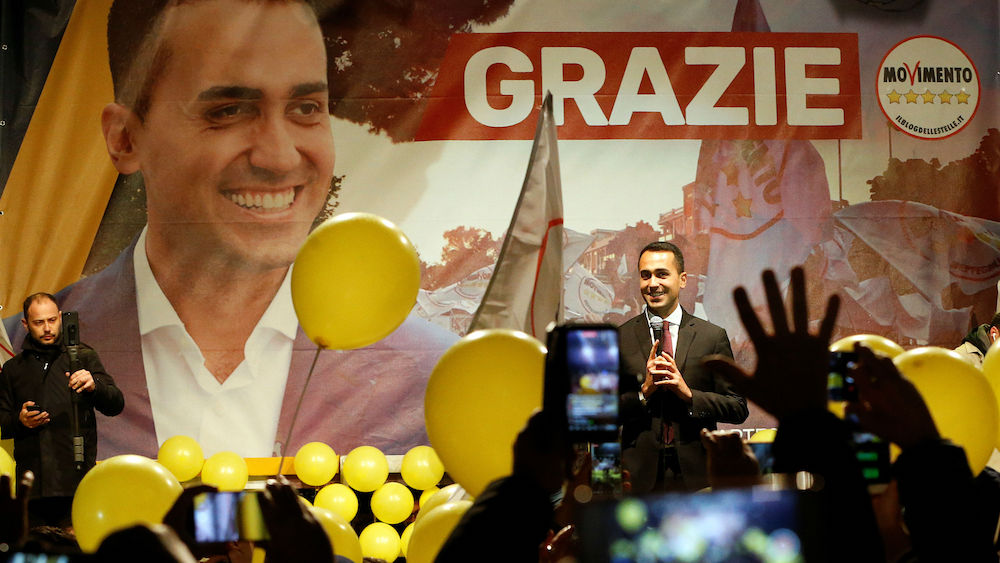More than 50 percent of Italian voters cast their ballots for far-right or populist parties in the country’s general election. But with no clear majority, Italy is stuck in limbo.
There was no clear winner in Italy’s general election—not that you would get that impression from the euphoria emanating from two populist parties, the Five Star Movement (M5S) and the League.
Luigi Di Maio, the 31-year-old leader of the anti-establishment M5S, hasn’t stopped grinning since March 4. On Tuesday, he told reporters that the elections were “a slap in the face for the old way of doing politics.” Meanwhile his rival Matteo Salvini, who heads the far-right League, stamped an image of himself onto bottles of wine with the words: “My Prime Minister is him.”
The pair certainly have reason to celebrate. M5S became the biggest single party in Italy’s general election, taking almost 33 percent of the vote; the League, with 18 percent, was the surprise winner within a coalition that included Silvio Berlusconi’s center-right Forza Italia and the smaller far-right Brothers of Italy. The coalition got more votes—37 percent—but neither side has the majority required to form a government.
After a gloomy campaign that hinged mainly on immigration and pies in the sky, Italians signaled that they wanted change, trouncing the “old guard”—Forza Italia and former Prime Minister Matteo Renzi’s center-left Democratic Party, which scored its worst result ever with just 19 percent.
No Winners, No Losers
In reality, there were no real winners or losers in Italy’s election. The vote produced a stalemate that could drag on for months, making it difficult even for pundits to envisage what form Italy’s next government will take.
All they can agree on is that caretaker prime minister Paolo Gentiloni of the Democratic Party will have to steer the ship with a steady hand in the meantime.
“I’m really lost,” said Roberto D’Alimonte, a politics professor at Rome’s Luiss University. “Everyone is confused, it’s a very chaotic situation. But the markets don’t seem to be worried. We’ll have to wait and see. We saw the same thing in Germany, Belgium, the Netherlands,” he said. “Time is essential.”
The first stages of haggling over a coalition government have produced little in the way of concrete results: Di Maio has called on rivals to bring him “proposals” that might help form a government, although he resolutely refuses to budge on M5S’s platform. The party’s most likely bedfellows are the League or the Democratic Party. The League’s Salvini has insisted his coalition should govern with him as prime minister, but he has not excluded an alliance with M5S.
Meanwhile, internal strife continues to cripple the Democratic Party since former prime minister Matteo Renzi announced he was resigning in the aftermath of the disastrous election performance. Interim leader Maurizio Martina wants the party to regroup in opposition. On Monday he called on M5S and the League to take responsibility. “The time for propaganda is over,” he said. “Your citizens asked for you to govern, now do it.”
Down But Not Out
That leaves Italy’s Berlusconi and his Forza Italia. The 81-year-old media magnate went into the elections believing he would be the kingmaker. He emerged weaker than expected, but not completely out of the game.
Still, with M5S pledging to get tough on conflict of interest rules and introduce a new law for media businesses, an alliance would be Berlusconi’s worst nightmare. After all, one of his central aims is to protect his business interests.
“Berlusconi is not sleeping at night because if M5S gets into government, those are the first two things it will do,” said D’Alimonte.
As the parties continue to squabble, the next major milestone will be the election of speakers for the two houses of parliament—the Chamber of Deputies and the Senate—at the end of March.
The most likely scenario is an M5S parliamentarian being appointed speaker of the Chamber of Deputies and one from the League leading the Senate.
“The election of the house speakers is a potential litmus test,” said Francesco Galietti, the founder of Policy Sonar, a Rome-based consultancy. “But at the same time, it is a little bit misleading,” he added. “Obviously having M5S and the League together is a scary prospect for outsiders, so investors could jump to the conclusion that it foreshadows a government.”
Gro-Gro-Ko?
There has been some speculation that we could see a broad coalition made up of all the key players on the political landscape, led by M5S. But because Italy’s various parties have such starkly different platforms, D’Alimonte finds such a union difficult to imagine. Galietti said that while momentum is building for the so-called Gro-Gro-Ko, one of the main questions would be whether the cabinet is made up of technocrats or politicians.
“There will be enormous disappointment if Italian voters find out that having voted en-masse for anti-establishment parties they instead get a mainstream government,” said Galietti.







